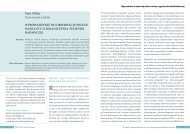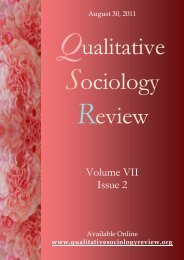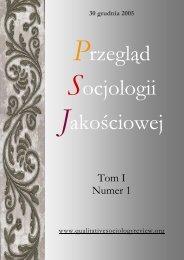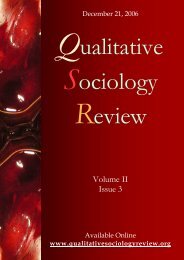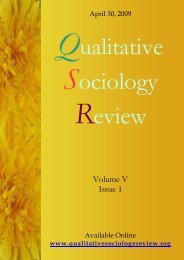Gillies, V. and Edwards, R. - Qualitative Sociology Review
Gillies, V. and Edwards, R. - Qualitative Sociology Review
Gillies, V. and Edwards, R. - Qualitative Sociology Review
Create successful ePaper yourself
Turn your PDF publications into a flip-book with our unique Google optimized e-Paper software.
social relationships are maintained outside of the family with parents seeking <strong>and</strong><br />
receiving help through their social networks. In contrast, Colemen’s category of low<br />
social capital encompasses a range of less traditional family circumstances including<br />
lone parents, parents who are both in full time employment, families reliant on<br />
welfare benefits <strong>and</strong> high income families whose financial status has freed them from<br />
reciprocal commitments.<br />
In the process of constructing our sampling frame, however, we identified<br />
various family forms <strong>and</strong> circumstances where Coleman’s social capital<br />
categorisations are less clear. For example, a family’s social capital status might be<br />
considered ambiguous if the mother only works part time during school hours.<br />
Coleman implies that there are situations where low social capital indicators are ”offset”<br />
by more positive circumstances (1988: 89). As a result, we decided to include an<br />
additional category of middle social capital to encompass families who appeared to<br />
fall between definitions of high <strong>and</strong> low. Using this schema, our sample consisted of<br />
6 high social capital, 6 middle social capital <strong>and</strong> 15 low social capital family<br />
households.<br />
Our theoretical sampling for the qualitative phase of our research drew on the<br />
work of Coleman, but the content <strong>and</strong> analysis of the in-depth interviews with parents<br />
was influenced by Bourdieu’s conception of the interdependence of social <strong>and</strong> other<br />
capitals. Our intention was to contrast Coleman’s predefined <strong>and</strong> formulaic<br />
assignment of social capital on the basis of household structural characteristics with<br />
Bourdieu’s more dynamic <strong>and</strong> contextual approach. Consequently our interviews with<br />
parents focused on a broad range of issues including time, money, locality, children’s<br />
health <strong>and</strong> development, practical aid, schooling, <strong>and</strong> kin <strong>and</strong> other social networks.<br />
Our subsequent analysis of this data sought to address the interaction between<br />
social <strong>and</strong> other capitals in the resources that parents can draw on <strong>and</strong> give. This<br />
methodological approach allowed us to relate contemporary, empirical data on<br />
families to the social capital theories of Coleman <strong>and</strong> Bourdieu.<br />
Social capital: matching data to theory<br />
Focusing first on the work of Coleman, we found little in his rigid formulation to<br />
reflect the lives <strong>and</strong> experiences of our interviewees. Our sampling frame enabled us<br />
specifically to investigate whether social capital is linked to family characteristics, as<br />
Coleman professes. However, in a comparison of households we could find no<br />
evidence to support this structurally based definition of high, middle or low social<br />
capital. On the contrary, family forms such as lone parent families, <strong>and</strong> parents<br />
claiming benefits in our sample were particularly well networked <strong>and</strong> clearly<br />
demonstrated the features associated with Coleman’s underst<strong>and</strong>ing of social<br />
capital, including obligations <strong>and</strong> expectations, information gathering potential <strong>and</strong><br />
effective norms <strong>and</strong> sanctions. Neither could we find any indication of Coleman’s<br />
predicted ”decapitalisation” in our sample. All of the households we interviewed were<br />
socially integrated in reciprocal support networks, <strong>and</strong> none described feeling<br />
isolated or unsure of whom to turn to for advice.<br />
Coleman’s theories are underpinned by concerns about increasing family<br />
diversity <strong>and</strong> social fragmentation, yet the findings from our study question both the<br />
premise that social capital is necessarily in decline <strong>and</strong> the assumption that changing<br />
family structures are to blame. Most parents in our sample received regular help from<br />
family members in some form or another, <strong>and</strong> all described strong friendship<br />
networks (<strong>Gillies</strong>, 2005). Lone mothers were particularly likely to describe an<br />
extensive <strong>and</strong> tight support network comprised of friends <strong>and</strong> family, while parents<br />
©2006 QSR Volume II Issue 2 www.qualitativesociologyreview.org 46



